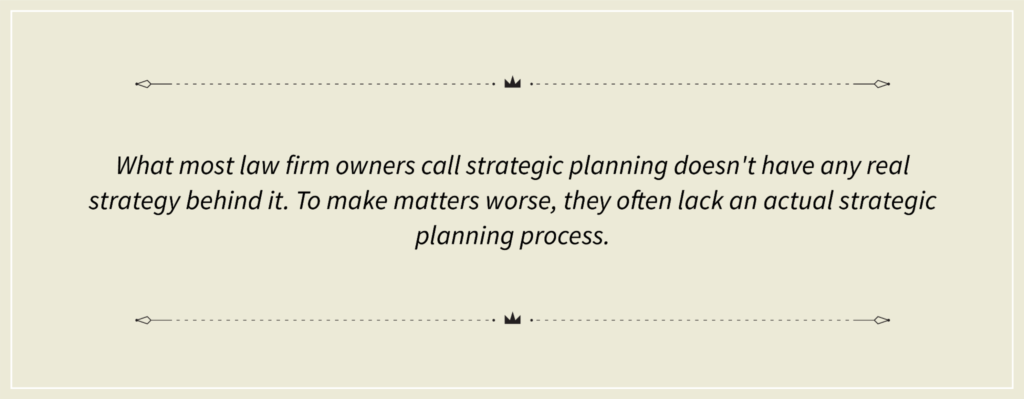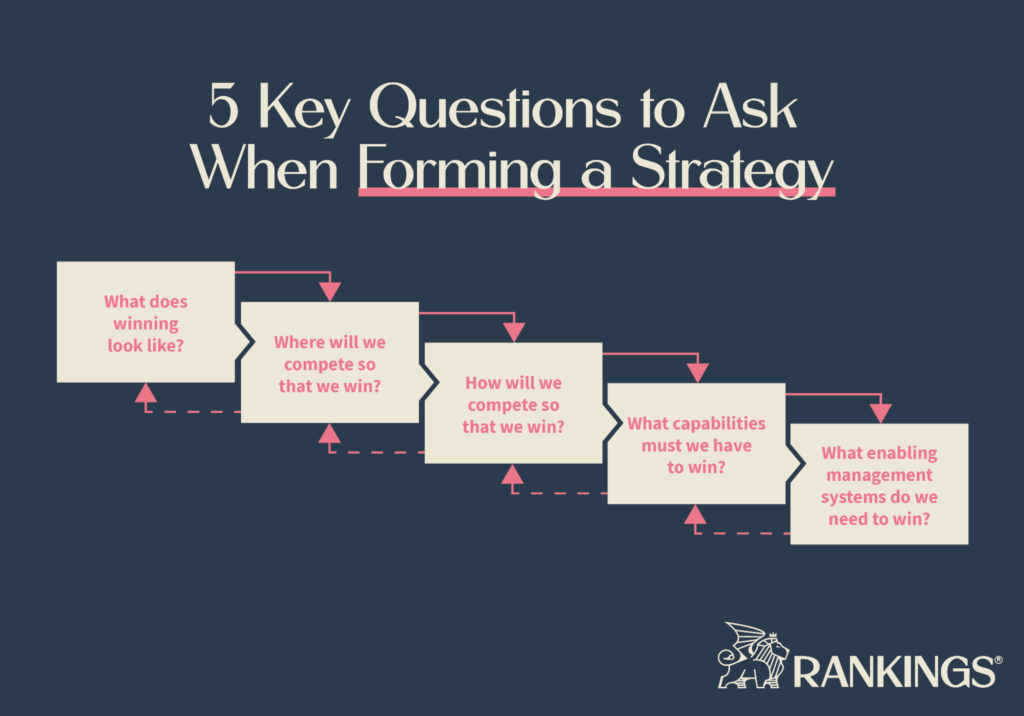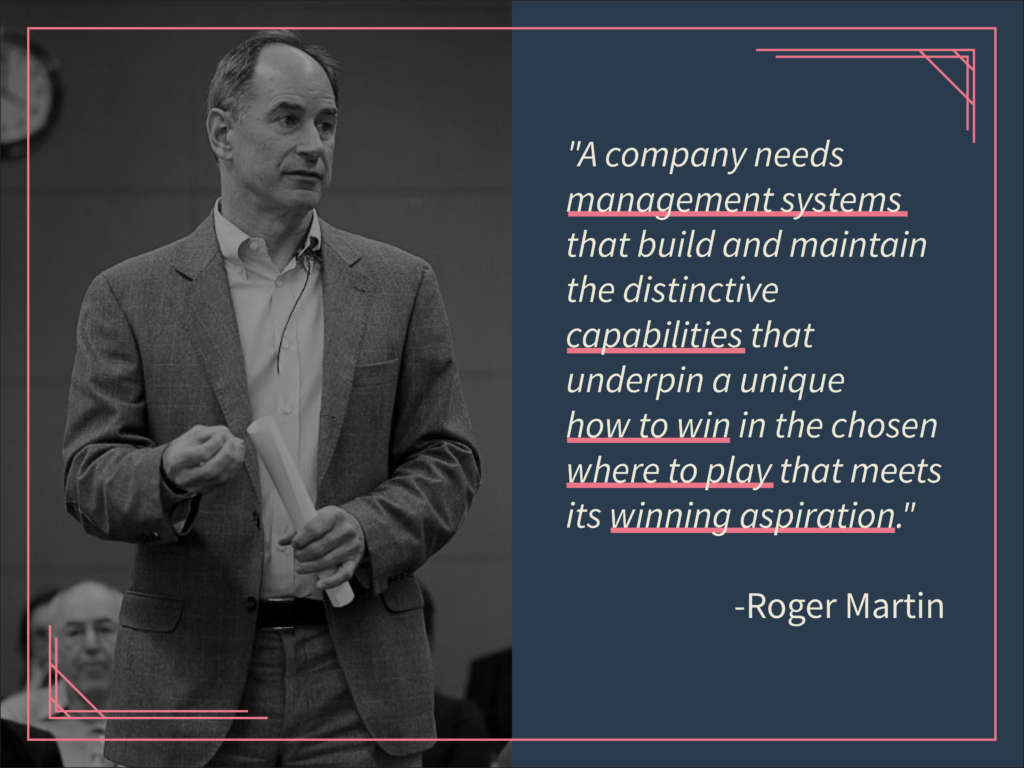Although strategic planning is a popular phrase among law firm owners, it’s a misnomer. Strategic planning isn’t the same thing as planning. Likewise, planning is not the same thing as strategy.
You need a coherent strategy that lays out how you’ll win as a law firm. But too many business owners confuse a business strategy with aimless “strategic plans.”
What is Strategic Planning?
Stripped down, strategic planning is just glorified planning. It doesn’t have anything to do with real strategy.
Instead, strategic planning is a set of activities a company says it’ll do. The set may sound good but doesn’t really drive the results you want.
That’s because what most law firm owners call strategic planning doesn’t have any real strategy behind it. To make matters worse, they often lack an actual strategic planning process.
In short, you develop a strategy and ask strategic framework questions any time you need to make a choice. This includes developing attorney marketing plans and business plans. Strategy doesn’t stop at this level, either. Instead, it goes down to every decision level in your law firm.
Once you create your strategy, your plans can fall into place. For example, you’ll find it easier to determine which marketing channels and tactics align with your law firm’s strategy.
Business expert Roger Martin, whose work appears on our books every lawyer should read list, explains why the misconception about strategic planning harms business owners who could benefit from properly applying strategy in their companies.
Every business owner, including lawyers who manage their own firm, knows that strategy is valuable. Most leaders think that strategic planning is about preventing discomfort and fear in the future. Martin argues that dealing with those two factors is at the root of true strategy.

Rather than looking for ways to cut risk, real strategy involves thinking about ways to improve your odds of success in spite of them.
Most “strategic plans” look pretty similar from one law firm to another. They include a vision statement with a big goal. They list plans or initiatives to meet that goal. Then there’s an analysis of the relationship between those initiatives and revenue.
Projecting many years into the future feels comforting. At face value, it seems like a decent way to eliminate risk, and it’s helpful for thinking through budgets.
But that’s not the same thing as a strategy.
Strategy involves questioning assumptions and thinking carefully about what you decide not to do. “Strategic plans” can help a company form a budget. But that leaves out the opportunity to question strategies deeply. Too many plans focus on meeting quarterly or annual goals instead of answering tough questions.
Most existing plans that lawyers call strategic fail because these plans are only specific about the first year, too.
Martin notes, “… management typically commits only to year one; in the context of years two through five, “strategic” actually means ‘impressionistic.’”
Plans can certainly help you create a budget and a set of intended activities for your business. But, the activities in these plans are aimless without real strategy. Creating the plan feels comforting, but it’s not the same as setting you up in the best possible way to fight for your desired outcome.
Once you know the difference between strategy and what most organizations pass off as “strategic plans,” you’re on your way to developing your own law firm strategy.
Key Questions to Answer Any Time You’re Trying to Make a Decision
Strategy is a set of choices. Businesses like law firms are always actively making decisions. What’s key is that strategy doesn’t end at the business level.
Instead, it cascades and flows down to every decision made within the company. This means you must think about the best ways for your choices to reinforce those at the next level.
This doesn’t happen in most existing businesses where initiatives get stalled. The problem is due to poor “choice chartering.”
When a leader makes a decision in an organization, subordinates must make choices in line with that decision. Instead, most staff members are told to “execute” the manager’s decision. Without any clear direction, most staff members make their best guess. When they fail, they’re then accused of “poor execution.”
What a leader must do to avoid this is focus on choice structuring. A manager must tell their staff the choice made but also share:
- Why the leader made that choice
- That the decision directs staff to make choices that reinforce the leader’s choice
- That the leader is available to help with this second-tier decision making
- That the original choice can be revisited if staff cannot find a reinforcing one at their level

To start this process, there are 5 key questions that lawyers should ask themselves to form a law firm strategy at any level. These are:
- What does winning look like?
- Where will we compete so that we win?
- How will we compete so that we win?
- What capabilities must we have to win?
- What enabling management systems do we need to win?
These are not linear steps. Instead, they are integrative and self-reinforcing. They demand that you circle back to the questions you asked earlier. This ensures your ideas fit together. You’ll consider each question individually and then how they influence one another.
What Does Winning Look Like?
Answering this question explains what success will look like for the decision you have made. This question creates alignment between the various goals you set for your firm. It establishes clear endpoints to get everyone on the same page about what success means overall.
You can ask this question at every level of your law firm. To define “winning,” you must reach beyond planning. Planning doesn’t actually incorporate what winning looks like. Instead, planning involves looking at a goal outcome and charting the path to that goal.
Where Will We Compete So That We Win?
Answering this question explains who you will serve, what types of cases you will take, and why taking those cases positions you in a way that will let you win. In short, it defines your playing field.
In answering this question at the business level, you’ll clearly define:
- Your geographic service area
- The category you service
- Your client segment
If you’re having trouble narrowing down your answers, check out the book Niching Up. Rather than casting a broad net, limiting your market to a specific niche could work out better.
How Will We Compete So That We Win?
Answering this question explains the decisions that you need to make in your chosen playing field so that you will win.
At the business level, you must compete either on cost or differentiating factors. The latter tends to be a more viable route for lawyers.
Consider the following:
- What makes us unique?
- What complaints/fears do clients typically have about lawyers?
- How do we use our unique qualities to overcome client complaints/fears?
Clients have plenty of choices in the legal market. To win them over, you must make the case that your law firm is the right choice compared to other options.
This question and the previous one are intrinsically tied together. As you approach these questions, you may find yourself revisiting them often.
What Capabilities Must We Have to Win?
Answering this explains the skills, abilities, and resources you need to win in your chosen playing field.
This is often where most lawyers struggle to decide which elements fit into “how to win” versus “capabilities to win.”
Your “how to win” is your theory of how you’re different from your competitors. To define it, you should feel confident that your competitors can’t or won’t match your competitive advantage.
Your “must-have capabilities” are the things you invest in to turn that theory of advantage into a reality. Here are some examples of how a law firm might cover capabilities:
- A staff of lawyers with skill and experience in the chosen practice area
- A way to get the word out about their firm to bring in new clients
What Enabling Management Systems Do We Need to Win?

Answering this question explains the systems you will use to build and maintain your must-have capabilities.
Here’s how Roger Martin breaks it down:
“A company needs management systems that build and maintain the distinctive capabilities that underpin a unique how to win in the chosen where to play that meets its winning aspiration.”
To effectively manage your law firm, you need to put systems in place to shore up your must-have capabilities. An example of this could be something like checking your legal CRM to follow up with every client throughout their cases.
The Four Seasons Hotel presents a helpful example of management systems.
They seek to win through a unique kind of service carried out by experienced staff members. They direct their resources into recruiting and hiring the right people in an industry that’s known for high turnover.
This plays out in a management system. The Four Seasons requires three in-person interviews for successful management candidates. Despite annual industry turnover rates as high as 70%, the Four Seasons keeps it below 10%.
Although the legal industry and hospitality might seem unrelated, they’re much more similar than you’d expect. In both industries, client service is key. Without exceeding client expectations, hotels and law firms bottleneck their future growth. Law firms and hotels both have to consider the best ways to attract and retain key staff, too.
To apply this to your own business, consider the following question:
Where in your law firm can you direct resources of time and money into building the systems that help you win?
Developing Your Own Law Firm Business Strategy
Running a successful law firm requires strategy for every decision you make. Working with an outside partner can help you connect your law firm strategy to your attorney marketing plan.
Rankings.io has helped many law firms that are ready to enhance their online presence. Contact us now to learn more about how we can help with your law firm strategic planning.
The post Why Strategic Planning for Law Firms Isn’t Enough appeared first on Rankings.




